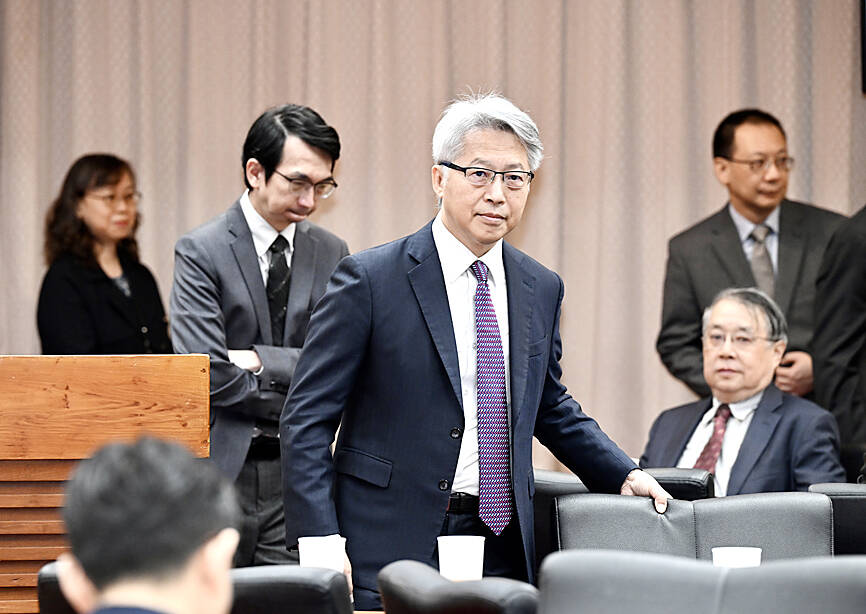Academia Sinica is to trial an expedited acceptance program for doctorate students, complete with subsidies, to attract Taiwanese to stay and study in Taiwan, as well as attract international experts, Academia Sinica President James Liao (廖俊智) said at a meeting of the legislature’s Education and Culture Committee yesterday.
In response to a question from Chinese Nationalist Party (KMT) Legislator Lin Pei-hsiang (林沛祥) about the organization’s plans to attract talent in the light of US tariffs, Liao mentioned the trial program, citing Taiwanese doctoral students who could not realize their dreams of pursuing advanced studies overseas due to the tariff situation.
Academia Sinica hopes to implement the system as soon as possible to help retain academic talent in Taiwan, Liao said, adding that the program could be expanded to include international students whose plans to study in the US have changed.

Photo: Lo Pei-de, Taipei Times
Academia Sinica Department of International Affairs Director Meng Tzu-ching (孟子青) said that participants in the program are to start in the next academic year.
The students are to choose one of 13 doctorate programs — taught entirely in English — under Academia Sinica’s Taiwan International Graduate Programs (TIGP), Meng said.
Qualification criteria state that applicants must be Taiwanese, have applied to study in doctorate programs abroad between the end of last year and the beginning of this year, and that their chosen area of study matches those provided by the TIGP.
Applicants can also apply for scholarships, which are to provide a NT$40,000 monthly stipend for the first two years if granted, and applicants would be eligible to receive NT$50,000 per month starting in the third year if they pass their doctoral qualification exams.
If applicants have been accepted by top-tier doctorate programs abroad and can provide relevant proof, they would be eligible for a monthly stipend of NT$6,000 on top of the scholarship.

The manufacture of the remaining 28 M1A2T Abrams tanks Taiwan purchased from the US has recently been completed, and they are expected to be delivered within the next one to two months, a source said yesterday. The Ministry of National Defense is arranging cargo ships to transport the tanks to Taiwan as soon as possible, said the source, who is familiar with the matter. The estimated arrival time ranges from late this month to early next month, the source said. The 28 Abrams tanks make up the third and final batch of a total of 108 tanks, valued at about NT$40.5 billion

Two Taiwanese prosecutors were questioned by Chinese security personnel at their hotel during a trip to China’s Henan Province this month, the Mainland Affairs Council (MAC) said yesterday. The officers had personal information on the prosecutors, including “when they were assigned to their posts, their work locations and job titles,” MAC Deputy Minister and spokesman Liang Wen-chieh (梁文傑) said. On top of asking about their agencies and positions, the officers also questioned the prosecutors about the Cross-Strait Joint Crime-Fighting and Judicial Mutual Assistance Agreement, a pact that serves as the framework for Taiwan-China cooperation on combating crime and providing judicial assistance, Liang

A group from the Taiwanese Designers in Australia association yesterday represented Taiwan at the Midsumma Pride March in Melbourne. The march, held in the St. Kilda suburb, is the city’s largest LGBTQIA+ parade and the flagship event of the annual Midsumma Festival. It attracted more than 45,000 spectators who supported the 400 groups and 10,000 marchers that participated this year, the association said. Taiwanese Designers said they organized a team to march for Taiwan this year, joining politicians, government agencies, professionals and community organizations in showing support for LGBTQIA+ people and diverse communities. As the first country in Asia to legalize same-sex

MOTIVES QUESTIONED The PLA considers Xi’s policies toward Taiwan to be driven by personal considerations rather than military assessment, the Epoch Times reports Chinese President Xi Jinping’s (習近平) latest purge of the Chinese People’s Liberation Army (PLA) leadership might have been prompted by the military’s opposition to plans of invading Taiwan, the Epoch Times said. The Chinese military opposes waging war against Taiwan by a large consensus, putting it at odds with Xi’s vision, the Falun Gong-affiliated daily said in a report on Thursday, citing anonymous sources with insight into the PLA’s inner workings. The opposition is not the opinion of a few generals, but a widely shared view among the PLA cadre, the Epoch Times cited them as saying. “Chinese forces know full well that